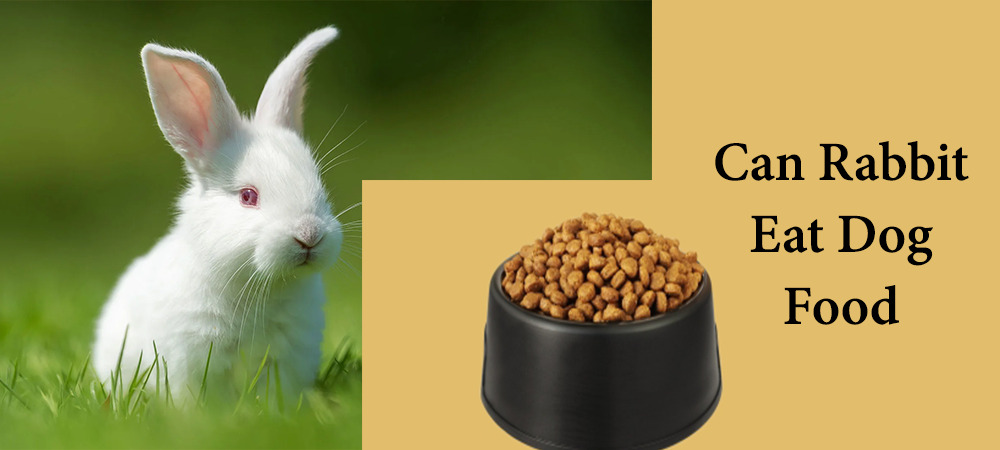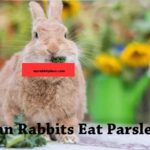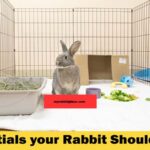Rabbits are super cute animals and people often adopt them and pet them. But taking care of them means making sure they stay healthy and eat healthy food. Sometimes people asks us can a rabbit eat dog food?
Well I will not recommend you to give it to your rabbit and the reason is given in detail in this blog post.
Along with being cute companions, rabbits can be raised for breeding stock, as medical and laboratory animals, and as show animals. No matter where or why you decide to keep rabbits, an adequate and nutritious food supply and management are key to keeping them happy and healthy.
Whether you have a rabbit, a dog, or any other pet, they all have very specific and different dietary requirements. Knowing the proper diet for each specific pet can help give them a happy and long life. Learn More on Rabbit’s Diet and Food what to feed them here
Can a rabbit eat dog food?
No, rabbits cannot be fed dog food. The reason is that dogs’ food is rich in fat, carbohydrates, and protein. A high-protein diet can lead to kidney damage and other serious threats. Moreover, the diet of dogs is high in fat and carbs, which leads to obesity in rabbits.
A stolen snack from the dog’s plate can be a cause for worry! Rabbits eating dog food can be detrimental to their health and well-being. If you keep more pets in your house, make sure that each of them gets different food supplies as per their needs.
However, if you are somehow running out of rabbit food, a small quantity of dog food as a treat will not hurt your rabbit in any way. Just ensure that soon they have access to hay and other fruits and vegetables.
To ensure your sweet bunnies are getting a nutritious diet, consider providing them with certified organic feed. Also, consult the vet about their food needs.
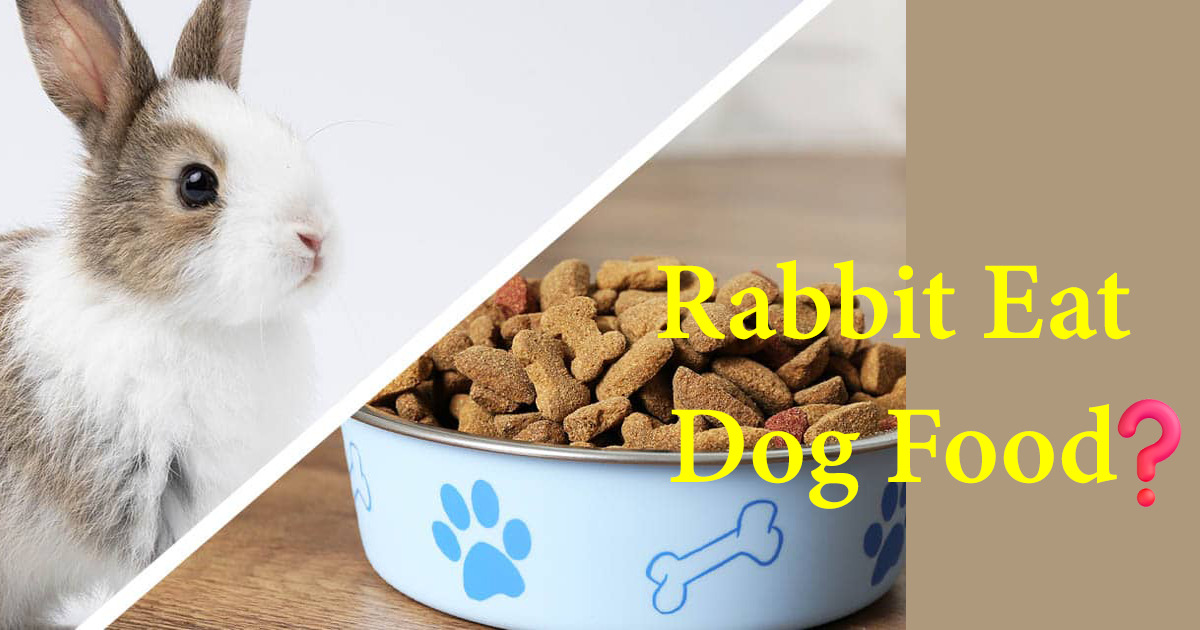
Should rabbits eat dog or cat food?
If a rabbit has eaten a little bit of a cat’s or dog’s food, probably won’t be a matter of concern for your rabbit. Often, whatever their body can’t digest will pass through their system as long as they’re getting their main food, “hay”.
However, stuffing rabbits with dog or cat food isn’t a good idea. Don’t take the risk and kindly replace the dog’s or cat’s food bowl with the rabbit-specific food bowl.
One of my friends had a bunny and a dog in the same house. And the bunny is in the habit of regularly eating dogs’ food. However, it does not cause any harm, but just to make you aware, it makes the bunny’s poop red. We thought it was blood, and we were scared. But when my friend consulted a vet, he told her that it was due to the excess protein.
So, even though the food does not directly hurt the rabbit, it is preferred to keep it out of their reach to be on the safe side. Why take a risk if there is food available for every kind of species?
Hopefully, now you know whether or not your rabbit eats dog food.
Read This Also - Check Can Rabbits Eat Bananas?
Risk factors of eating dog food
According to experts, rabbits are much like cows, horses, and guinea pigs in eating, unlike the cats, rodents, or other species. They are found to be grazing creatures and spend their time grazing throughout the day.
Other pets usually eat a few times a day but in the case of the rabbit, it’s not like that, and going without food for a certain period makes a rabbit seriously ill.
Here are some potential risk factors listed that you must know if you’re concerned for your rabbit’s health (side effects of dog’s food and severity of the illness will vary from bunny to bunny);
Kidney damage
A dog’s or cat’s food contains components that can seriously affect the rabbit’s health. And hence are not good for them, for example, Proteins, High Fat Content, Artificial Additives, High Levels of Salt, Artificial Sweeteners, and Chemicals and Pesticides.
Rabbits are herbivorous animals that depend on hay and other beneficial foods. Food products high in protein are not the most nutritious food options for them.
They cannot digest the high levels of protein in their diet. Eating too much animal protein will lead to kidney failure.
Infections in the urinary tract
Dog food is high in calcium, and too much calcium consumption by rabbits can cause UTIs and kidney infections. However, a small quantity of calcium is essential for a rabbit’s health. Which they get it in the hay, and which they eat every day.
The concentration of calcium found in hay is enough for them, and they didn’t require it from anywhere else. On the contrary, dogs’ food is loaded with calcium.
Rabbits will have an inability to properly process and digest excessive amounts of calcium. If they consume dog food, it builds up in their urinary tract and causes infections and the formation of stones too.
Dental problems
Dog’s teeth are designed in such a way that they are able to tear animal flesh, whereas rabbit’s teeth are such that they can grind plant stuff.
Dogs food does not have enough fiber and rough stuff in it, which can lead to issues in rabbits teeth. Rabbit teeth problems can stay hidden for a long time.
Chewing grass is important for rabbits, for even tooth wear and to prevent dental problems. Dog food does not serve this purpose. Foods like hay, pellets, carrots, and other leafy greens keep the rabbit’s teeth in good condition. Learn more about dental diseases in rabbits here.
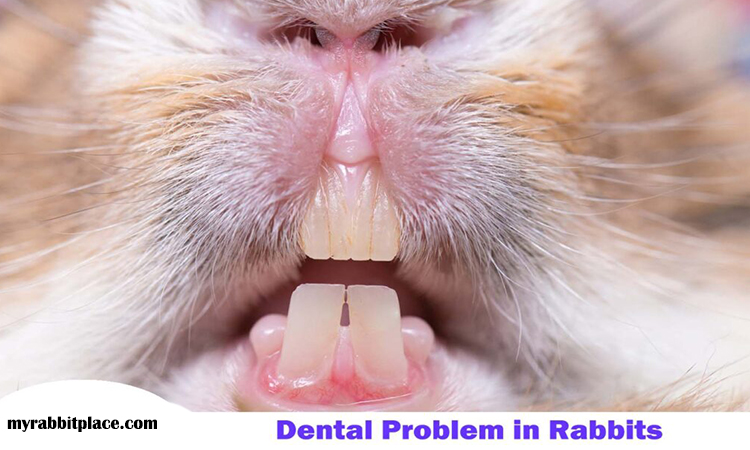
Intestinal distress
Though rabbits seem very careless, they grab whatever they find in their way, but eating anything can challenge their well-being.
Dog food might mess up the bacteria in rabbits belly. The stuff in dog or cat food, like fats and proteins, can be hard for rabbits to digest because their guts are used to plant food, not animal stuff.
It often leads to intestinal distress and the sudden death of a rabbit. So, you just need to make sure what’s suitable for your rabbit and what’s not.
Obesity
Dog and cat foods are high in fat, and the rabbit’s diet is mostly rich in fiber and carbohydrates. When a rabbit is introduced to a food high in fat and carbs, it can cause obesity, which brings on all other related health problems on its own.
Rabbits that are overweight can’t perform their activities of hopping, digging, and running around. This makes a rabbit lethargic and unhealthy. They also suffer from fragile bones.
Also Read - Can Rabbits Have Raisins?
What you should not feed to your rabbits?
It’s never ideal to feed rabbits unwholesome and unhygienic foods because it can cause serious health risks. Rabbits love to eat grassy leaves, hay, carrots, twigs, and other greens. While hopping here and there, rabbits often find trash like food items, which can have serious impacts.
Regarding this consideration, some of the products listed should never be fed to rabbits:
- Dog or cat food
- Grains
- Nuts
- Seeds
- Bread
- Biscuits
- Sweets
- Breakfast cereals
- Chocolate
- Corn
- Beans
- Peas
Though rabbits are naturally herbivores, but many garden plants are toxic to them as well. Hence, if you’re a rabbit owner, you must take care of what your rabbits are eating.
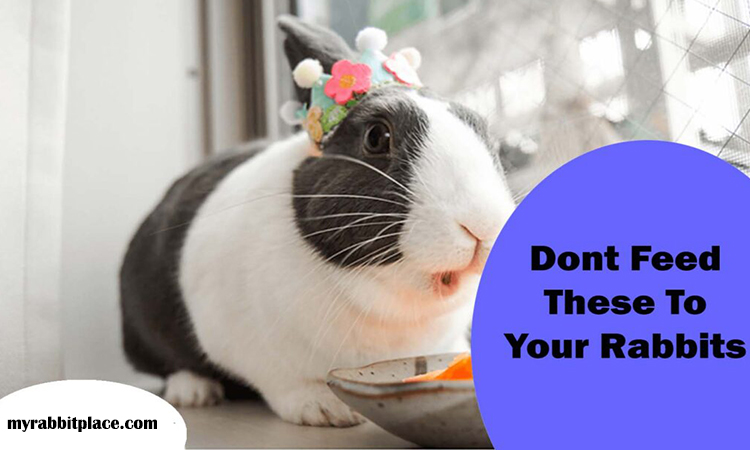
Concerning signs and symptoms if your rabbit has eaten something toxic
- The slow movement, hiding away, and sitting still
- Eating very little or refusing certain foods
- Glazed and redness of a rabbit’s eye
- Changing thirst levels
- Fast rate of breathing
- Reddish or indifferent poops.
- Restless behavior
- Vomiting and bloating
- Diarrhea
These were some of the potential indicators that indicate that your bunnies have eaten something wrong. If these symptoms continue for a long time, it can be a serious cause for concern.
If you want to be sure that your rabbit is really fine or not, you should offer them their favorite treat. If they refuse it, you should consult the vet immediately.
Even if no symptoms can be found in your rabbits after consuming dog food or any other toxic food in large amounts, bring them to the vet as soon as you can!
It might take little time to show signs of distress, but if you consult the vet earlier, it can reduce the chances of any distressful conditions, as at the initial stage, the vet will provide you with treatment recommendations that could surely save your rabbit’s life.
The ideal diet for your rabbits
| Plenty of water |
| Unlimited access to hay |
| Growing grasses and twigs |
| 1-3 cups of leafy greens |
| 25-50 grams of high fiber pellets |
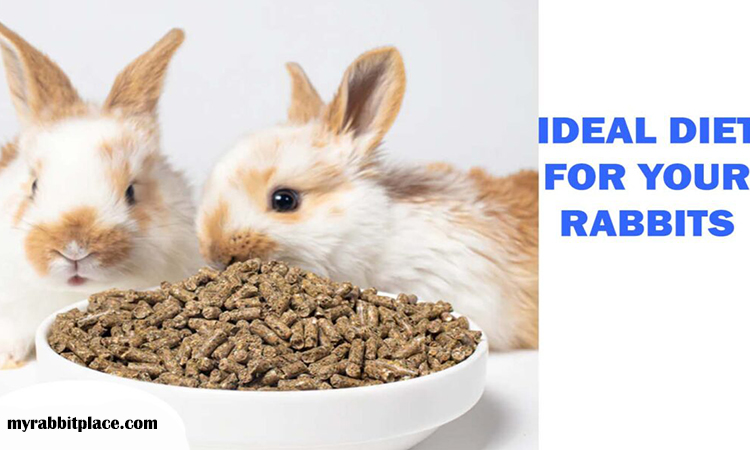
FAQ
Can I feed my rabbit dog food occasionally as a treat?
I will not recommend you to feed dog food to your rabbit not even as an occasional treat. Eating a small amount of unhealthy food might not seem bad right away, but it’s not good for their body’s needs and can make them sick later on.
What are the risks of feeding dog food to my rabbit?
Dog food can make your rabbit sick and cause many problems like stomach issues, becoming too fat, teeth problems, and troubles with their kidneys and liver also. It can sometimes make them act differently as well .
Instead of dog food, what should I feed my rabbit?
Instead of dog food you can give your rabbits lots of good hay, fresh vegetables, especially leafy greens, and just a bit of special rabbit food because that’s made to give them all the right nutrients.
What should I do if my rabbit has eaten dog food by mistake?
If your rabbit has eaten dog food by mistake then you should watch out for any strange behavior in your rabbit or if their stomach seems upset. If you see any issues, talk to the animal’s doctor to know what to do next.
Final Words
Rabbits are one of the cutest pets in the world, and if we pet them then it’s up to us to make sure they stay healthy. We need to give them the right food, but some foods can make them sick, so we should not give those to them.
One of them includes Dog food. Dog foods are rich in proteins and calcium, and they can cause a lot of issues, so you can’t even experiment with them. It can cause significant distress in rabbits. It’s as simple as that: rabbits cannot be given dog food, even in limited quantities.
Rabbits are pure herbivores, and their diet needs to be loaded with fiber. Feed them pellets, hay, vegetables, and other treats in smaller quantities. Ensure the safety of your rabbits and give them a happy and healthy life.
